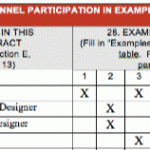
In a fiercely competitive environment, like we’ve been experiencing over the past few years, small differences can play a major role in whether you win or lose a proposal competition.
Let’s be honest with ourselves. We all provide the exact same services our competitors do. And for the most part, our qualifications and experience are the same.
Just imagine how hard it is for proposal evaluators to pick one winner between many extremely similar options.
In some cases, their choice could have a major impact on their career. Think about how challenging and scary that has to be for them.
The Safe Bet
If you had to decide right now which peanut butter to use for the rest of your life, which would you pick? Would you pick Jif, Skippy, Peter Pan, Skippy, or Smuckers? It’s probably an easy question. You’ll likely pick the one you have in your cabinet right now.
Ironically, the answer is so easy because the question is so difficult. All these products are essentially the same. So, the safe bet is the one you’ve gone with in the past.
Let me give you an example of what lengths people in our industry will go to make the safe bet. Just the other day, I was talking to an ex-Chief Engineer of a state Department of Transportation. We were talking about the selection process used at his Department of Transportation. He told me one of his most frustrating moments was when a project manager tried to select a firm she had used in the past even though the selection committee deemed another firm to be the most qualified. She took action to select her safe bet over a firm that was clearly more qualified to do the work.
That’s what we are up against. Unless the client has used you before, you’re not the safe bet. So, how can you compete? You compete by asking one simple question.
The Question in Question
This single question can dramatically increase your proposal wins. But it may fly in the face of almost everything you’ve been taught about proposals.
To help you understand the power behind this question, I need to tell you a little story about home insulation.
Home Energy Use and Loss Aversion
A few years back there was an academic research study conducted on homeowners.
The researchers went into people’s houses and performed a free energy audit. They checked all of the weather stripping and insulation in each house.
The homeowners were told these people were doing research on home energy use. But their research had nothing to do about energy. It was a social psychology experiment.
At the conclusion of the energy audit, half of the homeowners were told, “If you will insulate your home fully, you will be able to gain 50 cents a day, every day.” The other half were told, “If you fail to insulate your home fully, you will lose 50 cents a day.”
The researchers let some time pass and went back to see which homeowners insulated their houses. As they probably suspected, many more of the homeowners that chose to insulate their homes were the ones told they would lose 50 cents a day. Why is this?
It’s because of a psychological principle known as loss aversion. We are more influenced by what we stand to lose than by what we stand to gain.
What Will This Client Miss Out On If They Choose Someone Else?
Conventional wisdom has taught us to always tell clients what they will gain by choosing us. Ironically, that’s not how our brains work. We are more influenced by what we stand to lose.
So, a more powerful tactic is to tell the client what they stand to lose. What won’t they get if they choose another firm? What is it that nobody else can provide them?
So the one question that can dramatically increase your proposal wins is:
“What will this client miss out on if they choose someone else?”
Yes, this question is difficult to answer. But it’s the type of question marketers were made for.
The Question’s Application
Decision makers often cling onto one attribute when deciding which firm to choose. Unless you’ve done superior research and have real insight into what your competitors will say in their proposal, you can’t really predict what that attribute will be. And the decision makers reasoning won’t always be logical.
Here’s a quick story. Once upon a time there was a city government agency that chose an A/E firm to design a new facility. After the design was complete, the city council nixed the project citing lack of funds.
So, this agency put out an RFP for firms to redesign their current facility. The safe bet would have been to choose the firm who designed the new facility for them. They had a great relationship with this designer and enjoyed working with them. But they didn’t.
They could have chosen the team they felt knew the most about designing this type of facility. But they didn’t.
Instead, they choose a firm that resided within the city limits. The committee believed giving the work to a business in the city would help sway the city council to give them the funds they needed for the renovation.
That was the one thing the other firms could not provide: the idea that using this local firm might help sway the city council’s decision. If the agency chose one of the other firms, they would “lose out” on the slight possibility, this extra leverage, to change council’s thinking.
Asking, “What will this client miss out on if they choose someone else,” forces you to identify the benefits that only your firm could provide. It’s the single question that can dramatically increase your proposal wins.
If you liked this article, please subscribe below or on the right side of the homepage. If you want to give us your thoughts on this issue, please leave a comment below.





Powerful stuff, Matt – and absolutely true. This is similar to when I force a client to realize that they can’t say their firm or team is “uniquely” qualified unless they do something that no other firm on the planet does, or that no other firm provides that service in the same manner. Otherwise, every submitting firm can have identical lists of why they are “unique.” This question is a great way to get a firm to understand that it could provide high-quality services and great client care without having a single quality to distinguish itself from the rest of the pack.
Bernie,
As always, thank you for the comment.
Another good one, Matt. I do indeed take into consideration what clients won’t get if they don’t select my firm, but I could stand to do so more clearly/consistently. The question is, how does one fold this into a response without appearing to be a “fearmonger.” In other words, one doesn’t outright state in a proposal, “If you don’t select us, you will not benefit from XYZ.” Correct? Or am I wrong, and that’s what you’re saying! I am assuming you have to say “Our firm can give you this, this, and this” often enough to make the client realize for themselves that they would be missing out. Please let me know if I’m off base here…
Did you see that today Apple just released an iPhone with a “fingerprint identity sensor?” They don’t have to tell me if I buy any other phone, I’m going to miss out on that. But when they were in the lab working on this thing, I’m sure they said…”what can we put in here that nobody else has?”
We don’t have the power to come out with new “products.” So, our challenge is finding the uniqueness…however small, however seemingly insignificant…and making it significant.
For those who enjoyed reading this (and I did), check out the book ‘Selling the Invisible’. I just shared a similar story from that book with one of our clients. You don’t have to be ‘the best’ choice, you have to be a good choice and a safe choice. People are more likely to choose a firm they are familiar with (who does good work) than to test the waters based on a lot of promises (even if they sound great).
Sally,
Thank you for the comment!
Sally, I’ve really enjoyed Harry Beckwith’s books over the years, including “Selling the Invisible.” I give it to my lawyer/CPA/banking clients.
Matt asks a great question, though I generally frame it as a question that needs to be answered thrice; e.g., “What are the three things that you do or have that no one else does?” That way, if the one answer misses the mark, the other two have a shot.
What if you don’t know what makes you different? I suggest a serious feedback/post-mortem campaign from an audience composed of your key stakeholders; clients, prospects, referral sources, peers, partners, competitor/colleagues, media, alumni, other personal contacts. Candid responses to direct questions will give you an excellent idea of what makes you different.
James, I want to be cautious about seeming to promote what I do but your question, “What if you don’t know what makes you different?” really resonates with me. What our company does is help firms answer that question through the process of client based feedback throughout the project lifecycle. Our feedback system gives companies the opportunity to check in with their clients regularly and the scores (and feedback comments) are a way to identify that differentiator – that ‘one thing they will miss if they don’t hire you’. Again, I don’t want to use this as an opportunity to promote our firm but if I can offer any additional information, please let me know.
The government agency anecdote resonates well. This post shows your genuine expertise in these matters by approaching the question from various viewpoints, a powerful and effective key in marketing and proposals. Cheers
Thanks, Matt! A great question to ask in the go/no-go and kickoff meetings.
Thanks Matt, The question compels one to better think and market oneself (firm) in a more competitive way.